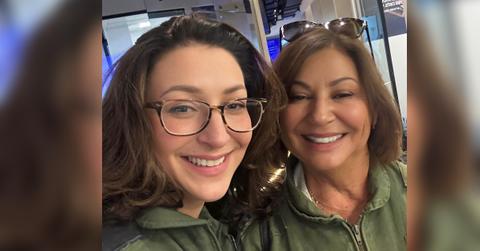 NEWS
NEWSA Mother’s Gift: One Family’s Journey To Health Through Genetic Testing

Orit Reisman Berliner (L) and her mother, Zipporah Reisman (R)
May 9 2025, Published 1:19 a.m. ET
Mother’s Day means many things to different people. For some, it’s a relatively straightforward holiday–a chance to buy flowers, write a heartfelt card, and honor the women who gave them life. For others, it’s about celebrating the women with whom they may not share a genetic link, but who played an important role in their upbringing. For Orit Reisman Berliner, this past Mother’s Day was an opportunity to share her and her mother’s story to raise awareness about the importance of reproductive genetic testing. By sharing their story, it’s Orit’s hope that no mother or daughter will have to lose the other to preventable illness.
When Orit was only 16 years old, her mother Zipporah was diagnosed with stage 3 breast cancer. Dealing with her mother’s mortality left a deep emotional mark, but thankfully, her mother survived and has remained in remission for over 25 years. At the time, neither of them knew one of the factors associated with a higher risk of breast cancer: a mutation in the BRCA gene.Not only do BRCA mutations increase the lifetime risk of breast cancer to over 80%, but they can also greatly increase the risk of ovarian, pancreatic, and prostate cancers. These mutations are also hereditary–each child of a parent with a BRCA mutation has a 50% chance of inheriting the mutation.
When Zipporah Reisman was first diagnosed with stage 3 breast cancer, BRCA was a new discovery and not yet widely used. Years later, however, Orit learned of the BRCA2 mutation and its associated cancer risks when two cousins on her mother’s side tested positive for the mutation. As a young mother herself, Orit knew she needed to be proactive to protect her health for the sake of her kids. She shared what she’d learned about her cousins with her OB/GYN, who encouraged her to get tested.When she tested positive, she took the step of joining a high-risk surveillance program to take charge of her health.
Her diagnosis prompted her entire family to get tested for the genetic mutation. Her mother was confirmed as a carrier, as was one of her three siblings, a textbook example of the 50/50 genetic inheritance pattern.At age 30, Orit began early screenings and eventually chose to undergo a preventative double mastectomy to reduce her cancer risk from 80% to just 2%. Throughout the entire surgery and recovery process, Orit’s mother stood by her side. Their shared bond had not only brought them closer together but had inspired Orit to champion the genetic testing that had reduced her cancer risk and possibly saved her life.
Want OK! each day? Sign up here!
Going through a health scare can be debilitating for many people, but Orit’s journey became one of empowerment and advocacy. Eager to share her experience with others and encourage people to undergo genetic screening, Orit began working for jscreen, a national nonprofit that provides accessible, at-home genetic testing and telehealth counseling services.
jscreen.org offers access to two forms of genetic testing: a Hereditary Cancer Test that identifies genetic mutations commonly associated with cancer risk, such as the BRCA mutation; and a Reproductive Carrier Screen that evaluates hundreds of common genetic conditions, such as Tay-Sachs and cystic fibrosis. Both screening tests can determine whether or not the individual is a carrier of a genetic condition or mutation that can be passed on to children, offering mothers and fathers the opportunity to make informed decisions early on in the family planning process. Orit witnessed firsthand how hereditary cancer genetic testing also informs individuals of their own risk of developing cancer, giving them the opportunity to undergo early screenings and other preventative measures.
The testing process through jscreen.org is easy: individuals can register at jscreen.org and purchase a test kit, which will be shipped to their home.After performing the saliva collection, they can mail the kit back to jscreen and receive results within three weeks. jscreen also provides expert support from licensed genetic counselors, who will explain the results and deliver guidance on what to do next.
Nearly losing her mother at such a young age was a harrowing experience for Orit. Thanks to genetic screening, she was able to mitigate her own risk and spare her children from undergoing the same experience. Orit hopes to use her story to shine a light on the power of genetic screening as a tool for keeping families healthy through knowledge of one’s health risks. Her story is powerful not just for those with a family history of cancer, but for anyone who understands the lifelong bond between a mother and her children.


